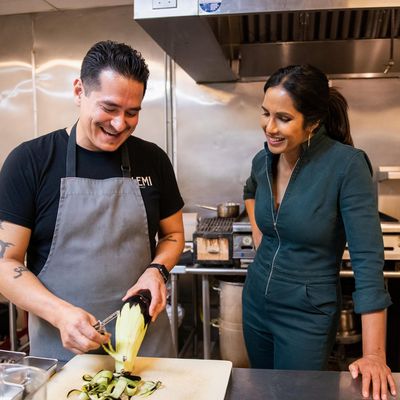
In the second episode of HuluÔÇÖs Taste the Nation, Padma Lakshmi visits Milwaukee to showcase how German immigrants have contributed to U.S. food culture, particularly AmericaÔÇÖs beloved hot dog. After visiting a restaurant called KegelÔÇÖs Inn, where she learns to fry schnitzel and speaks to owner Julian Kegel about the experience of his German immigrant grandparents, LakshmiÔÇÖs expression shifts, her calm, serious listening face turning mischievous. With a toss of her head, she asks, ÔÇ£Can I ask you another question? Are you related to Dr. Kegel of the Kegel exercises?ÔÇØ he replies, ÔÇ£You betcha,ÔÇØ only to have Padma shoot back, ÔÇ£I want you to know IÔÇÖve been doing them this whole time.ÔÇØ Kegel valiantly tries to banter on, saying heÔÇÖs used to having people ask this question, otherwise heÔÇÖd really be blushing. But a coquettish smirk crosses LakshmiÔÇÖs face as she says, ÔÇ£YouÔÇÖre a little pink,ÔÇØ pointing out an earnest flush of color spreading across KegelÔÇÖs cheeks.
Flirtatious, teasing moments like this make Taste the Nation such fun to watch. But LakshmiÔÇÖs winsome, down-to-earth style isnÔÇÖt just an aesthetic flourish; itÔÇÖs an affective gesture toward a wide-ranging optimism about what food can do in the face of racism and oppression. As a show borne out of LakshmiÔÇÖs partnership with the ACLU, Taste the Nation is expressly meant to help her ÔÇ£go where the interesting immigrant stories are and use food as the Trojan horse to embed myself there and find out what life was like for them on a daily basis.ÔÇØ ThereÔÇÖs a political purpose to Lakshmi appearing personable. By luring the viewer in with a smile and the promise of delicious food, she uses her demeanor to shift the focus from the plates on the table to the faces and voices of the immigrants, Black people, and indigenous people onscreen. Her charm and affability telegraphs the hope that breaking bread can change someoneÔÇÖs mind, working to turn the camera away from food and onto the person, transforming Taste the Nation from a food show to a series of colorful, intimate portraits.
In an episode about chop sueyÔÇÖs origins in San Francisco, for example, Lakshmi chortles alongside comedian Ali Wong, cracking jokes about how geoduck looks like ÔÇ£sea dick.ÔÇØ Raunchy humor and effervescent laughter serves as an appetizer to a larger story about Chinese-American immigration. In Los Angeles, Lakshmi blows kisses at the camera, gets her coat stuck in a car door, and bites into succulent kebab, but the main focus isnÔÇÖt her antics, itÔÇÖs the softly crying cook who admits he will likely never return to Iran. These are poignant, moving stories expertly set up by LakshmiÔÇÖs onscreen charisma.
But there are times when LakshmiÔÇÖs optimistic buoyancy gets in her way. In an episode that examines the U.S.-Mexico border in El Paso, Lakshmi visits H&H Carwash and Coffee shop, a caf├® staffed mostly by Mexican citizens who cross the border every day from Ju├írez, and which is owned by Maynard Haddad, a Trump-supporting Syrian immigrant. Lakshmi moans over a bean burrito and strikes up a rapport with the Mexican staff, as they tell her about the realities of living with increased border security. But she also sits next to Haddad as he gruffly doubles down on his decision to vote for Trump, despite his apparent affection for his employees. Haddad clutches at LakshmiÔÇÖs hand while he talks to her, awkwardly drawing her close to him, and though Lakshmi appears more restrained than usual, she doesnÔÇÖt challenge what he says. ÔÇ£If the camera was off and we had time and I didnÔÇÖt have to go to my next location, I might have sat there and been like, ÔÇÿYouÔÇÖre foolish,ÔÇÖÔÇØ she later said in an interview with Eater. ItÔÇÖs a shame she didnÔÇÖt say such a thing. In choosing to maintain her optimistic, personable fa├ºade onscreen, Lakshmi instead contributes to a both-sides discourse that asks us to consider the complexity of a cranky-but-maybe-ultimately-lovable Trump voter. Not only does this sidestep a discussion of immigrants and children of immigrants in the U.S. who champion conservative immigration policy, but it muffles the stunning cruelty and racism the Trump presidency has unleashed on nonwhite people, including HaddadÔÇÖs own employees.
In another episode dealing with indigenous cultures and foods in Arizona, Lakshmi claims that ÔÇ£food sovereignty is the keyÔÇØ to the sovereignty of the Apache nation. Such an idea is glossy, attractive, and fits squarely into the hope that a delicious dish could turn a political tide, but it ultimately falls flat when considering the centuries of slaughter, land theft, and forced migration that indigenous people have faced at the hands of the United States. Nothing can overcome such violence, and certainly not food.
It is a joy to watch Lakshmi flirt and joke, a delight to see her turn serious and listen intently, tenderly even, as someone shares their coming-to-America story. ItÔÇÖs her magnanimity that makes Taste the Nation a series of intimate, food-catalyzed portraits, putting faces to dishes all across the country. But for Taste the Nation to be a true portrait, it must also deal honestly with raw hurt, grief, and rage. As wonderful as it is to see Lakshmi laugh and banter, there are moments where it would be refreshing to see her lash out, if even just a little bit. Just as her charm serves to uplift and empower the immigrant, Black, and indigenous voices, LakshmiÔÇÖs frustration, anger, or sorrow could also work to express the very real stakes of racism in the U.S.

